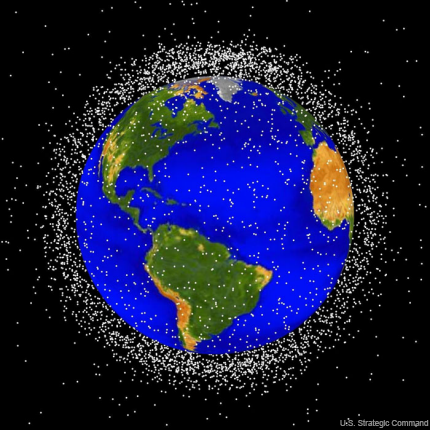Stratcom expands space surveillance with Israel agreement
U.S. Strategic Command recently entered into a Space Situational Awareness data sharing agreement with Israel, adding to a growing list of partners.

A Stratcom illustration depicts the objects in low-Earth orbit.
The U.S. Strategic Command is continuing to partner with other nations in data sharing and situational awareness about satellites and debris orbiting in space. Most recently, Stratcom entered into a Space Situational Awareness data sharing agreement with Israel that, like agreements the United States has with other countries, will enable both to better track objects in space, thereby increasing the safety of their spaceflight operations, according to a Stratcom release.
“U.S. Strategic Command is committed to improving our space situational awareness services and increasing our cooperation through formal partnerships such as these, especially as more countries, companies and organizations field space capabilities and benefit from the use of systems there,” said Adm. Cecil D. Haney, Stratcom commander. “After all, we have a shared interest in acting responsibly, promoting transparency and enhancing the long-term sustainability, stability, safety and security of space.”
“This agreement places Israel together with other spacefaring nations, which see themselves as parties to the effort of sustaining the space environment for global stability and security; an effort which will also contribute to the national security of Israel,” said Israeli Air Force Brig. Gen. (Res) Amnon Harari.
In February, Stratcom announced a similar partnership with Germany. Along with Israel and Germany, the United States also has Space Situational Awareness agreements with the United Kingdom, the Republic of Korea, France, Canada, Italy, Japan and Australia, as well as with two international organizations – the European Space Agency and the European Organisation for the Exploitation of Meteorological Satellites.
In the United States, the Joint Space Operations Center maintains the Space Surveillance Network and tracks more than 16,000 objects in low-Earth orbit, which the space below 2,000 kilometers in altitude and is the most cluttered with orbital debris. About 5 percent of the objects it tracks are functioning payloads or satellites, 8 percent are spent rocket bodies and about 87 percent are debris or inactive satellites.
“SSA data-sharing agreements enhance multinational space cooperation and streamline the process for [Strategic Command] partners to request specific information gathered by its Joint Space Operations Center at Vandenberg Air Force Base in California,” Stratcom said. “The information is crucial for launch support, satellite maneuver planning, support for on-orbit anomalies, electromagnetic interference reporting and investigation, satellite decommissioning activities and on-orbit conjunction assessments.”



